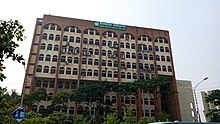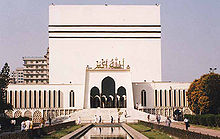| Revision as of 15:07, 25 December 2007 editAditya Kabir (talk | contribs)Autopatrolled, Extended confirmed users, File movers, Pending changes reviewers, Rollbackers24,908 editsm →History: copyfix← Previous edit | Latest revision as of 06:53, 30 December 2024 edit undo180.211.162.162 (talk)No edit summary | ||
| (137 intermediate revisions by 67 users not shown) | |||
| Line 1: | Line 1: | ||
| {{Short description|Government organization in Bangladesh}} | |||
| ⚫ | '''Islamic Foundation Bangladesh''' is |
||
| {{Infobox organization | |||
| | name = Islamic Foundation Bangladesh | |||
| | native_name = ইসলামিক ফাউন্ডেশন বাংলাদেশ | |||
| | logo = Logo of Islamic Foundation.svg | |||
| | logo_size = 170px | |||
| | logo_alt = | |||
| | logo_caption = ] of Islamic Foundation Bangladesh | |||
| | image = Islamic Foundation Bangladesh.jpg | |||
| | size = <!-- (image size, optional, default 200px) --> | |||
| | caption = Head office of Islamic Foundation Bangladesh | |||
| | motto = <!-- (optional) --> | |||
| | formation = {{start date and age|22 March 1975}} | |||
| | founder = ] | |||
| | extinction = <!-- (date of extinction, optional) --> | |||
| | type = Islamic education, Publication and research activities | |||
| | region_served = Bangladesh | |||
| | headquarters = Islamic Foundation Bangladesh, Agargoan, ], ], ] | |||
| | location = | |||
| | membership = | |||
| | language = ] | |||
| |leader_title = ] | |||
| |leader_name = ] | |||
| | leader_title2 = ] | |||
| | leader_name2 = Abdus Salam Khan<ref>{{Cite web|date=23 September 2024|title=officer list|url=http://islamicfoundation.gov.bd/site/view/officer_list/-}}</ref> | |||
| | leader_title3 = ] | |||
| | leader_name3 = | |||
| Mohammad Ismail Hossain | |||
| | main_organ = {{flagicon|Bangladesh}} ] | |||
| | parent_organization = | |||
| ] | |||
| | num_staff = 1477 | |||
| | budget = Allocated by Government | |||
| | website = {{URL|islamicfoundation.gov.bd}} | |||
| }} | |||
| ⚫ | '''Islamic Foundation Bangladesh''' ({{langx|bn|ইসলামিক ফাউন্ডেশন বাংলাদেশ}}) is a government organization under the '']'' in ] working to disseminate values and ideals of ] and carry out activities related to those values and ideals.<ref name="BangIFB">{{cite book |last1=Amran |first1=Syed Mohammed Shah |last2=Ali |first2=Syed Ashraf |year=2012 |chapter=Islamic Foundation Bangladesh |chapter-url=http://en.banglapedia.org/index.php?title=Islamic_Foundation_Bangladesh |editor1-last=Islam |editor1-first=Sirajul |editor1-link=Sirajul Islam |editor2-last=Jamal |editor2-first=Ahmed A. |title=] |edition=Second |publisher=]}}</ref><ref name="Direct">{{cite web |url=http://www.bangladeshdir.com/category/society-and-culture/religion-and-spirituality/ |title=Islamic Foundation |website=Bangladesh Directory |access-date=25 December 2007 |archive-date=11 August 2017 |archive-url=https://web.archive.org/web/20170811153549/http://www.bangladeshdir.com/category/society-and-culture/religion-and-spirituality/ |url-status=dead }}</ref> The head office of the foundation is in Dhaka, which is supported by 6 divisional offices and 64 district offices, as well as 7 Imam Training Academy Centers and 29 Islamic Mission Centers.<ref name="Direct"/> The director general is the chief executive of the foundation.<ref name="Direct"/> | ||
| ==History== | ==History== | ||
| ], Sub Office of the Islamic Foundation Bangladesh]] | |||
| In 1959, two organizations were formed in ], ] to propagate the teachings and following of Islam. The Baitul Mukarram Society built the ] and Islamic scholars formed a '']'' ( |
In 1959, two organizations were formed in ], ] to propagate the teachings and following of Islam. The Baitul Mukarram Society built the ] ({{langx|ar|بيت المكرّم}}; the holy house) mosque and Islamic scholars formed a '']'' ({{langx|ar|دار العلوم}}; house of knowledge) to popularize and research on Islamic philosophy, culture and way of life.<ref name="BangIFB"/> In 1960, the Darul Ulum was renamed as Islamic Academy and was made a branch of ''Central Institute of Islamic Research'' based in Karachi.<ref name="BangIFB"/> | ||
| The current organization came into effect in 1974, when ] formally inaugurated as the Islamic Foundation.<ref>{{cite news |title=Country to be run as per Madinah Charter: PM |url=http://www.thedailystar.net/country-to-be-run-as-per-madinah-charter-pm-16759 |newspaper=] |agency=UNB |date=22 March 2014 |access-date=28 April 2016}}</ref> | |||
| On 20–22 March 1978, the foundation organized a seminar sponsored by the ] and attended by representatives of 16 countries including Bangladesh.<ref name="BangIFB"/> In 1979–80, development of the foundation got a new momentum.<ref name="BangIFB"/> | |||
| ==Controversy== | |||
| In 1972, the Islamic Academy was briefly banned for alleged support for the ] against the ].{{cn}} The Academy has been blamed for working to Islamize politics in Bangladesh.{{cn}} | |||
| In 2015, Islamic Foundation Bangladesh issued a ] banning the use of chairs for elderly worshipers in ]. The head of the foundation, Shamim Afzal told ], "There are no instances of the Prophet praying while sitting on a chair," despite numerous ]s contradicting this claim.<ref name=":0" /> He added that "chairs spoiled the beauty of the mosques."<ref name=":0">{{cite news |title=Prayers on chairs ban sparks outrage in Bangladesh |url=http://tribune.com.pk/story/896263/prayers-on-chairs-ban-sparks-outrage-in-bangladesh/ |newspaper=] |agency=AFP |date=2 June 2015 |access-date=7 June 2015}}</ref> | |||
| ] Branch Office]] | |||
| This led to outrage and protest from more erudite ], who termed it "an incorrect and exaggerated decision."<ref name=":0" /><ref>{{cite web|title=Bangladeshis Decry Chairs Ban in Mosques|url=http://www.onislam.net/english/news/asia-pacific/486853-bangladeshis-decry-chairs-ban-in-mosques-.html|website=OnIslam.net|access-date=7 June 2015}}</ref> The ] ] issued a statement that she was "stunned" by such a ], terming it incorrect. She added that she herself offered prayers in chairs during flights.<ref>{{cite news |last1=Tusher |first1=Hasan Jahid |date=2 June 2015 |title=Islamic Foundation fatwa incorrect: Prime Minister Sheikh Hasina tells cabinet meeting, says she herself offers prayers in chairs during flights |url=http://www.thedailystar.net/business/islamic-foundation-fatwa-incorrect-91204 |newspaper=The Daily Star |access-date=7 June 2015}}</ref> | |||
| On ] ], the Baitul Mukarram Society and the Islamic Academy were integrated into one the Islamic Foundation through an ordinance that led to the Islamic Foundation Act promulgated on ] ].<ref name=BangIFB/> The head office of the Foundation was located initially at a building adjacent to the Baitul Mukarram mosque.<ref name=BangIFB/> On 20-22 March 1978, the Foundation drew the attention of the Muslim world when it organized a seminar at Dhaka on human and natural resources in the Islamic countries. The seminar was sponsored by the ] and attended by representatives of 16 countries including Bangladesh.<ref name=BangIFB/> In 1979-80, development of the Foundation got a new momentum.<ref name=BangIFB/> In 1999, the head office was shifted to its own premises in the ] area of Dhaka.<ref name=BangIFB/> | |||
| == |
==See also== | ||
| * ] | |||
| According to the Islamic Foundation Act, the aims and objectives of the organisation are:<ref>The Islamic Foundation Act 1975 (Act XVII of 1975)</ref> | |||
| * ] | |||
| * To set up, manage and maintain mosques, Islamic centres, academies and institutes | |||
| * To conduct research on the role of Islam in culture, science, and civilization | |||
| * To help disseminate Islamic ideals regarding world fraternity, tolerance and justice | |||
| * To promote studies on Islamic history, philosophy, culture, laws and judiciary | |||
| * To publish books and magazines on these subjects | |||
| * To organize conferences, lectures, debates, seminars and symposiums | |||
| * To introduce and award prizes in recognition of outstanding contributions to different fields of Islam | |||
| * To develop projects on subjects related to Islam and extend support to other such projects | |||
| * To provide scholarships to researchers for studies on Islam | |||
| * To take care of management and development of the Baitul Mukarram Mosque | |||
| * To undertake any other activities that are in line with the above aims and objectives. | |||
| ==References== | ==References== | ||
| Line 26: | Line 59: | ||
| ==External links== | ==External links== | ||
| {{commons category}} | |||
| * | |||
| * {{official website|http://www.islamicfoundation.gov.bd}} | |||
| * | * | ||
| {{Authority control}} | |||
| {{Bangladesh-org-stub}} | |||
| ] | ] | ||
Latest revision as of 06:53, 30 December 2024
Government organization in Bangladesh| ইসলামিক ফাউন্ডেশন বাংলাদেশ | |
 Logo of Islamic Foundation Bangladesh Logo of Islamic Foundation Bangladesh | |
 Head office of Islamic Foundation Bangladesh Head office of Islamic Foundation Bangladesh | |
| Formation | 22 March 1975; 49 years ago (22 March 1975) |
|---|---|
| Founder | Sheikh Mujibur Rahman |
| Type | Islamic education, Publication and research activities |
| Headquarters | Islamic Foundation Bangladesh, Agargoan, Sher-e-Bangla Nagar, Dhaka, Bangladesh |
| Region served | Bangladesh |
| Official language | Bengali |
| Chairman | A F M Khalid Hossain |
| Director General (Senior District and Sessions Judge) | Abdus Salam Khan |
| Secretary | Mohammad Ismail Hossain |
| Main organ | |
| Parent organization | Ministry of Religious Affairs |
| Budget | Allocated by Government |
| Staff | 1477 |
| Website | islamicfoundation |
Islamic Foundation Bangladesh (Bengali: ইসলামিক ফাউন্ডেশন বাংলাদেশ) is a government organization under the Ministry of Religious Affairs in Bangladesh working to disseminate values and ideals of Islam and carry out activities related to those values and ideals. The head office of the foundation is in Dhaka, which is supported by 6 divisional offices and 64 district offices, as well as 7 Imam Training Academy Centers and 29 Islamic Mission Centers. The director general is the chief executive of the foundation.
History

In 1959, two organizations were formed in Dhaka, Bangladesh to propagate the teachings and following of Islam. The Baitul Mukarram Society built the Baitul Mukarram (Arabic: بيت المكرّم; the holy house) mosque and Islamic scholars formed a Darul Ulum (Arabic: دار العلوم; house of knowledge) to popularize and research on Islamic philosophy, culture and way of life. In 1960, the Darul Ulum was renamed as Islamic Academy and was made a branch of Central Institute of Islamic Research based in Karachi.
The current organization came into effect in 1974, when Sheikh Mujibur Rahman formally inaugurated as the Islamic Foundation.
On 20–22 March 1978, the foundation organized a seminar sponsored by the OIC and attended by representatives of 16 countries including Bangladesh. In 1979–80, development of the foundation got a new momentum.
Controversy
In 2015, Islamic Foundation Bangladesh issued a fatwa banning the use of chairs for elderly worshipers in mosques. The head of the foundation, Shamim Afzal told Agence France-Presse, "There are no instances of the Prophet praying while sitting on a chair," despite numerous hadiths contradicting this claim. He added that "chairs spoiled the beauty of the mosques."

This led to outrage and protest from more erudite ulema, who termed it "an incorrect and exaggerated decision." The Prime Minister Sheikh Hasina issued a statement that she was "stunned" by such a fatwa, terming it incorrect. She added that she herself offered prayers in chairs during flights.
See also
References
- "officer list". 23 September 2024.
- ^ Amran, Syed Mohammed Shah; Ali, Syed Ashraf (2012). "Islamic Foundation Bangladesh". In Islam, Sirajul; Jamal, Ahmed A. (eds.). Banglapedia: National Encyclopedia of Bangladesh (Second ed.). Asiatic Society of Bangladesh.
- ^ "Islamic Foundation". Bangladesh Directory. Archived from the original on 11 August 2017. Retrieved 25 December 2007.
- "Country to be run as per Madinah Charter: PM". The Daily Star. UNB. 22 March 2014. Retrieved 28 April 2016.
- ^ "Prayers on chairs ban sparks outrage in Bangladesh". The Express Tribune. AFP. 2 June 2015. Retrieved 7 June 2015.
- "Bangladeshis Decry Chairs Ban in Mosques". OnIslam.net. Retrieved 7 June 2015.
- Tusher, Hasan Jahid (2 June 2015). "Islamic Foundation fatwa incorrect: Prime Minister Sheikh Hasina tells cabinet meeting, says she herself offers prayers in chairs during flights". The Daily Star. Retrieved 7 June 2015.